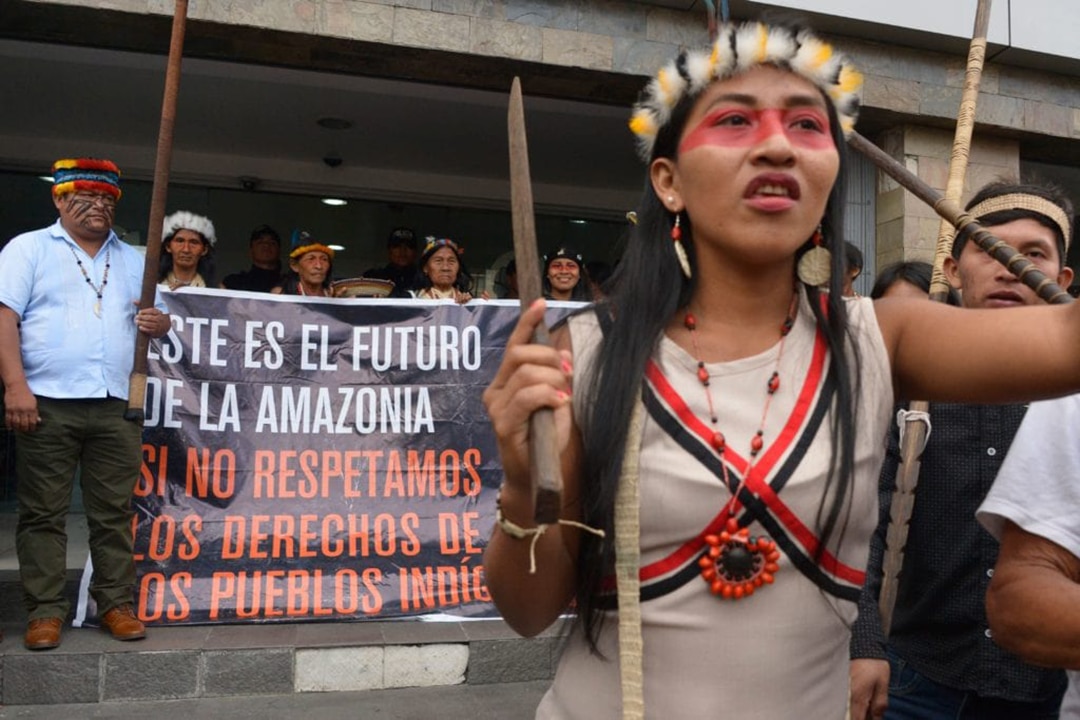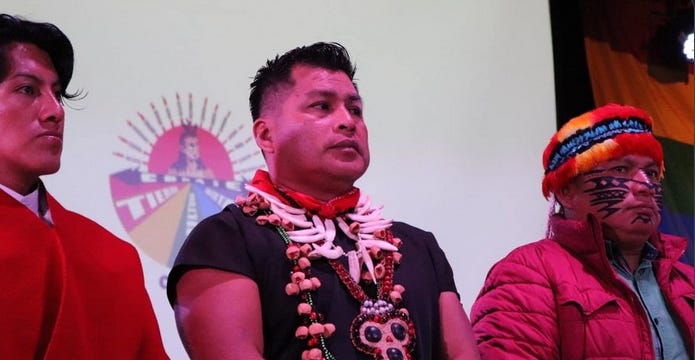Subscribe to Zero-Sum Pfear & Loathing



by | Mar 5, 2023
Another Amazonian environmental activist was murdered last week. Eduardo Mendúa, a member of the A’i Cofan people of Ecuador, was shot in the chest twelve times by hooded gunmen in front of his wife while they were working in their garden.
Rather than call him an environmental activist, I will call Eduardo Mendúa a forest protector. He was working to block the latest expansion of oil drilling in tribal land: an oil access road extension that would allow new drilling in the region’s last remaining intact rain forest.
It is a story that has been repeated throughout Latin America for the last 50 years. Indigenous activists attempting to stop drilling, mining, and logging operations face brutal intimidation tactics designed to dissuade them, and any others who might share their views, from getting in the way of profitable extraction. Over a thousand have been murdered just in the past decade.

Eduardo Mendúa, Photo by Kayla Jenkins
A friend who knew Eduardo personally tearfully shared the news with me this morning. An array of culprits and causes sprang into my mind. I wanted, as perhaps the reader wants right now, to find someone upon whom to affix the blame. If we rooted out those people, we could stop future atrocities from happening, no?
No. As with the El Salvador prison I wrote about a couple days ago, this horrifying tragedy draws from many sources. Of course, the gunmen who committed the murder should be apprehended and prosecuted, along with any who conspired with them. But even if that happens, the problem is far from solved.
A little history: Oil drilling in the region began in the 1960s under the management of Texaco (later acquired by Chevron). Texaco pumped oil until 1990 (wreaking havoc in the process through toxic waste, oil spills, and the like). Today the state-owned oil company Petroecuador is in charge of oil extraction. So my favorite go-to culprit, an evil foreign corporation, is not readily available to blame.
Neither is Petroecuador. You see, the oil project (a road extension and new oil platforms) caused intense division in the A’i Cofan community. Many of them welcomed the jobs they believed would result from opening up more land to oil drilling, and the President of the local A’i Cofan town of Dureno had signed an agreement with Petroecuador giving them permission. It was in a climate of escalating violence between those in favor of and opposed to the project that Mendúa was slain.
Who are we now to blame? We could mentally categorize the local people into the good ones and the bad ones, but this reflex of blame prevents us from seeing deeper causes. The questions I ask are, What are the forces that pit villager against villager? What are the systems that result in a domestic, publicly-owned oil company doing the same dirty work that foreign companies once did?
Here is a parable that illuminates what is happening. Once upon a time, thousands of people were locked up in a concentration camp. The warden let them do whatever they wanted, as long as they didn’t leave the camp. However, he also provided only three-quarters of the food necessary to keep them alive.
Driven by desperation, the inmates began fighting each other. They divided into gangs, ethnic gangs, religious gangs, racial gangs. Some of the more powerful ones managed to control enough of the food to feed their members, to the detriment of the rest. The other gangs grew indignant that the dominant gang was hogging more than their share of resources. They called for justice, equity, and inclusion. Each party invented all kinds of narratives to justify their position. Amid all the sound and the fury, no one noticed that the origin of the conflict was that the warden wasn’t giving them enough food.
We could expand the story to include the warden himself, subject perhaps to systemic pressures that give him hardly any choice. But let’s return to Ecuador. Like most countries, Ecuador is subject to international debt pressure. The consequences of not making debt payments are severe. How do nations like Ecuador obtain the hard currency to make payments? By converting nature into raw materials and the population into labor to produce exports. The debt pressure radiates throughout the entire economy. Government, corporations, and individuals are all under pressure because there is never enough “food” – that is, because all of the debt comes with interest, there is always more debt than the original amount of money.
In 2007, Ecuador asked the world to help it conserve the Yasuni rainforest, which some say is the biologically richest in the world. Unfortunately it is also rich in oil deposits—more than $7 billion worth lies beneath it. So Ecuador’s President at the time, Rafael Correa, said his country would forgo half that amount if international donors would pay Ecuador the other half through a U.N.-administered fund. The funding didn’t come through—less than 1 percent was ever pledged—despite the strenuous efforts of the Ecuadorian government to lobby for the idea. In 2013 they gave up and announced plans to develop the region. Following an intense but fruitless campaign by the indigenous inhabitants to stop it, in 2016 a consortium of Chinese oil companies was given development rights. Oil drilling commenced in 2017.
It is hypocritical to tell countries like Ecuador: “Preserve your rain forests—but keep making the debt payments and shipping us the cheap oil that is only possible by destroying the rain forest.” It is hypocritical to condemn violence against forest protectors while propping up the system that requires that anyone standing in the way of financialization of resources must be eliminated. It is hypocritical to decry the dominant gang in the concentration camp while also restricting their food.
My point here is not to condemn hypocrisy. And I don’t mean to imply that the international debt system is the only cause of violence against forest protectors. If we really want it to stop, though, we have to let the grief and anger propel us past the easy off-ramps of convenient blame. The pro-drilling villagers are themselves in a very difficult situation, living in a nation devastated by decades of colonialism and neo-liberal economics. Not only have these continually stripped wealth from Ecuador; they have also severely disrupted prior community structures, livelihoods, cultural pride, moral agreements, and the social fabric generally.
Let us not conclude that since the causes of violence against activists are systemic in nature, we should not bother to address conditions on the ground. Certainly, we should strive to protect the forest protectors and arrest their murderers. I hardly need offer a reason why. In fact, conditions are ripe to end the tactics of violent intimidation of indigenous forest protectors once and for all. These conditions include public awareness of indigenous rights and the history of their physical and cultural genocide, coupled with the technological means to make their stories known. Let us make this murder visible, and establish that no longer will such dirty work remain in the shadows.
For the violence to end though, such efforts must be accompanied by broader changes. Otherwise, protecting a forest here only increases the pressure to liquidate a forest somewhere else. Stopping an oil well in Ecuador increases the pressure to open a lithium mine in Bolivia. Saving the Amazon shifts logging and mineral exploitation to the Congo.
What, specifically, should these broader changes be? Debt cancellation would be a good start, accompanied by stewardship agreements like those Rafael Correa proposed. Just as current development lending is contingent on infrastructure spending and austerity policies, debt cancellation could proceed in stages contingent on good forest stewardship. The indigenous communities that the desperation for money tears apart would have another source of income: the preservation of their homelands. The need to provide for their families would no longer conflict with the sacred calling to preserve their forests.
Ecuador’s external public debt is around $35 billion. Full cancellation would cost one-third US spending on the war in Ukraine last year. Reducing the interest rate to zero instead would cost a tiny fraction of that. The same could be done for all ecologically critical nations, relieving much of the pressure on their ecosystems, at a cost far lower than the world’s military budgets. Isn’t the point of military spending supposed to be security? What could be more important to security than the ecological resiliency and climatic stability that rain forests provide?
Of course, the external debt of Ecuador and other countries is itself embedded in a larger context. It is a product of the nature of money itself (money as we know it, that is). Remove the debt, and the pressures will eventually rise again in a different form. But it is a good first step, an immediate and doable stopgap measure to stanch the hemorrhaging of indigenous blood and ecological treasure.